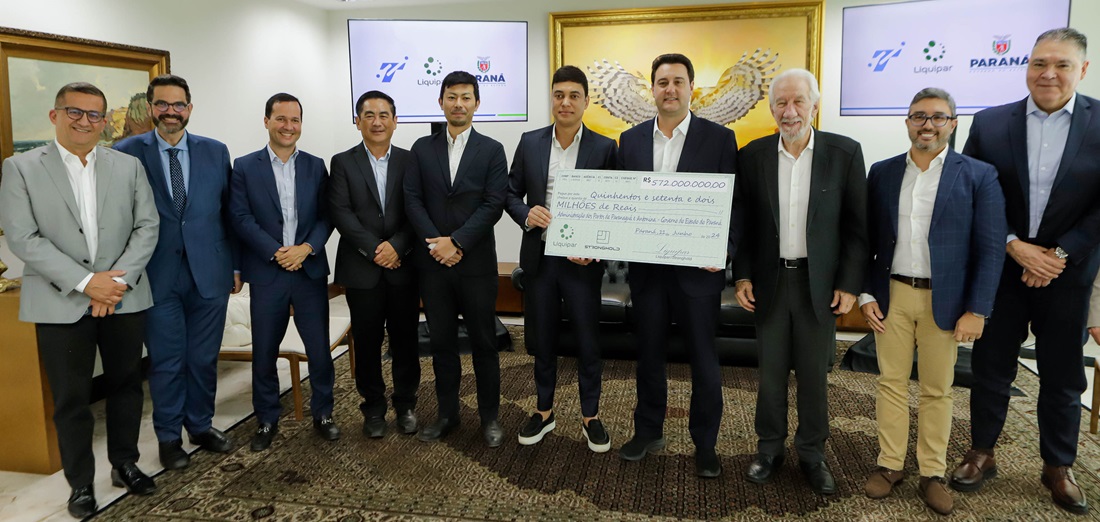
Incoming investments to triple Paranagua Port leased area capacity
Jun, 12, 2024 Posted by Gabriel MalheirosWeek 202424
Liquipar Port Operations, which acquired the area PAR 50 at the Port of Paranaguá last year, plans to invest R$572 million to triple the terminal’s capacity for handling liquids, particularly fuel. The company communicated its decision to Governor Carlos Massa Ratinho Junior, who met with the firm’s board of directors and representatives from Toyota Tsusho do Brasil, a partner in the project, on Tuesday, June 11.
The investment exceeds initial projections. Leased for R$1 million in an auction held on the Stock Exchange, the area was initially slated for a minimum investment of R$338.2 million to expand operational capacity. The terminal, covering about 85,000 square meters, currently has a storage capacity of 70,000 cubic meters, which is expected to increase to 210,000 cubic meters.
“Liquepar’s investment of over 500 million reals is essential [to revitalize] this underutilized port area. We put it up for auction on the Stock Exchange, and the winning group will take on this endeavor, including by expanding the berthing space for ships,” said Governor Ratinho Junior. “In addition to storing liquid fuels, the terminal will also be able to operate natural gas, enhancing the port’s cargo mix”
Liquipar’s major shareholder, Cleiton Santos Santana, explained that the investment is set to begin shortly after the company officially claimed control over the area two months ago. “We will triple the static storage capacity from the current 70 million liters to 205 million liters by building new tanks with a capacity of 140 million liters,” he said. “We are also going to construct a new pier to facilitate the export and import of fuels.”
Concessions to the private sector
Since 2019, five areas of the Port of Paranaguá have been granted to the private sector, with another three auctions scheduled for later this year. These concessions ensure greater legal and operational security for the port by allowing winning companies to invest in these areas, as Liquipar will do. The terminal under Liquipar’s concession is designated for operations with liquid products, such as diesel, biodiesel, and other chemicals.
“Liquipar represents today a significant asset for liquid cargo operations. With these new investments in additional storage tanks and a new berth, we will be able to significantly increase our cargo volume, serving not only Paraná but also all the states that rely on the Port of Paranaguá for their imports and exports,” said Luiz Fernando Garcia, president of Portos do Paraná.
Port authority Portos do Paraná is preparing to lease three additional areas for storing grains. The PAR 14, PAR 15, and PAR 25 concessions, linked to the first phase of the T pier, are expected to boost throughput and storage capacity at the Port of Paranaguá, which boasts record figures in recent times.
The three areas are intended for operations with solid bulk cargo of vegetable origin (such as soy, corn, and meals), as outlined in the Zoning and Development Plan of the Port of Paranaguá (PDZ).
PAR 14 combines three areas totaling approximately 49,000 square meters. PAR 15 is the terminal where Cargill currently operates, covering approximately 40,000 square meters. PAR 25 combines two adjacent operational areas.
These auctions will enable Portos do Paraná to implement the first phase of the T-pier. The new structure will feature two berths, each with a throughput capacity of up to 16 million tonnes per year. Additionally, the expansion of berth 212 is under consideration, aiming to increase operational capacity by over 150% and prevent infrastructure loss in the Export Corridor.
-
Other Cargo
Mar, 21, 2025
0
Optimism: Footwear Exports Grow 14.7% in the First Two Months of 2025
-
Other Cargo
Feb, 22, 2022
0
Imports and costs threaten mask production in Brazil
-
Trade Regulations
Nov, 22, 2024
0
Market access in Peru for Brazilian gelatin and collagen exports
-
Meat
Dec, 27, 2022
0
Brazil: pork export revenue drops despite record shipments

